Why Trump Wants Sudan to Befriend Israel - Two Articles
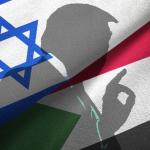
Sudan and Israel Agree US - Brokered Deal on Normalising Relations
Jason Burke and Oliver Holmes
The Guardian
October 23, 2020
https://www.theguardian.com/world/2020/oct/23/sudan-and-israel-agrees-us-brokered-deal-to-normalise-relations
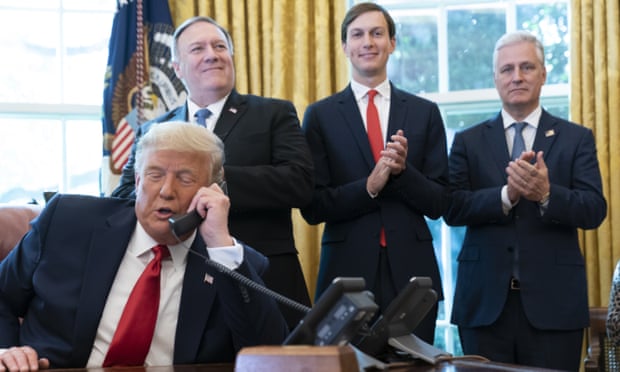
Donald Trump on a phone call with the leaders of Sudan and Israel. Behind him are Mike Pompeo, Jared Kushner and the national security adviser, Robert O’Brien. Photograph: Alex Brandon/AP
Israel and Sudan have agreed to work towards normalising relations in a deal brokered by the US that would make Sudan the third Arab country to set aside hostilities with Israel in the past two months.
Donald Trump sealed the agreement in a phone call on Friday with the Israeli prime minister, Benjamin Netanyahu, his Sudanese counterpart, Abdalla Hamdok, and Abdel Fattah al-Burhan, the head of Sudan’s sovereign council.
“The leaders agreed to the normalisation of relations between Sudan and Israel and to end the state of belligerence between their nations,” a joint statement by the three countries said.
However, it was not immediately clear whether Sudan’s transitional government has the authority to strike such a deal. The country remains without a parliament and elections are due in 2022.
Trump sought to score domestic political points over Joe Biden, his challenger in next month’s US presidential election, asking Netanyahu:“Do you think Sleepy Joe could have made this deal?”
Netanyahu responded: “Uh … one thing I can tell you is, we appreciate the help for peace from anyone in America.”
Trump, seeking to appeal to pro-Israel voters, has pushed countries in the Arab world to normalise relations with the Jewish state. Last month the United Arab Emirates and Bahrain agreed to establish ties with Israel under US-mediated deals, despite protests from the Palestinian leadership.
Wasel Abu Youssef, a senior Palestinian Liberation Organisation official, described Sudan’s decision as a “new stab in the back”.
Though Khartoum has been largely marginal to Middle Eastern politics in recent decades, the normalisation has significant symbolic value. After the 1967 war, Arab powers met in Khartoum to pledge three “noes”: no peace with Israel, no recognition of Israel, and no negotiations with Israel.
Netanyahu said Sudan was now saying the opposite. “Yes to peace with Israel, yes to the recognition of Israel, and yes to normalisation with Israel. This is a new era.”
Khartoum’s fragile transitional government had come under heavy pressure from Washington, which offered incentives, including help to access billions of dollars of desperately needed financial assistance from multilateral organisations.
As part of the agreement, Trump took steps to remove Sudan from a US government list of countries accused of promoting terrorism.
In a statement, the White House said Sudan and Israel had agreed to end the state of belligerence between their nations, and to begin economic and trade relations, with an initial focus on agriculture.
“This is obviously a great breakthrough,” Trump’s son-in-law and adviser, Jared Kushner, told Reuters. “Getting peace agreements done are not as easy as we are making them look right now. They are very hard to do.”
The announcement came after sunset in Israel and during Shabbat, the Jewish holy day of rest, when the country largely closes down, meaning there was little immediate response from politicians or the public.
While Sudan has far from fully committed to the deal, it will be seen in Israel as a major step forward. Unlike the UAE and Bahrain, which have never fought with the Jewish state, Sudan sent forces to fight in the war around Israel’s creation in 1948 and during the six-day war of 1967. In the 1970s, Israel backed Sudanese insurgents fighting the Khartoum government.
Raphael Ahren, a journalist for the Times of Israel newspaper, wrote earlier on Friday that peace with Sudan would be a “whole new ball game” in comparison with the UAE and Bahrain deals. “For one, a warm yes from the capital known for the ‘three noes’ would likely have a tremendous psychological impact on Israelis. ‘Those who used to reject us so bitterly have finally embraced us,’ many might reasonably say.”
However, resistance in Sudan is likely to be significant. Hamdok said last month that he had told the US secretary of state, Mike Pompeo, he would not link his country’s removal from the terrorism list with normalisation of relations with Israel.
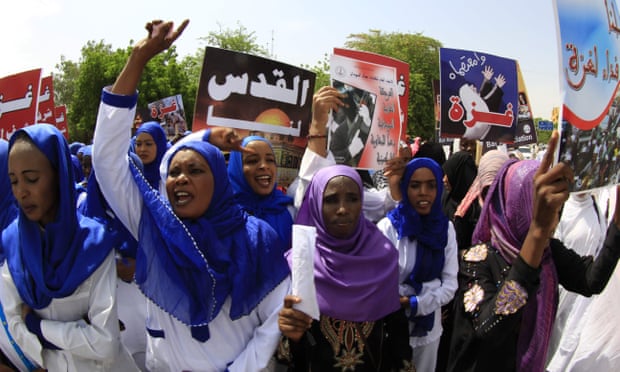
A Sudanese protest against an Israeli military offensive on the Gaza Strip in 2014. Photograph: Ashraf Shazly/AFP/Getty Images
Before his fall in 2019, the authoritarian ruler Omar al-Bashir had shifted from a de facto alliance with Iran to closer relations with Saudi Arabia, and there have been contacts between the intelligence services of Israel and Sudan in recent years.
Burhan, the most senior figure under the country’s power-sharing arrangement, held an unannounced meeting with Netanyahu in Uganda this year. Netanyahu later said the two governments were “establishing cooperative relations”, and Sudan has agreed to allow flights to Israel to fly over its territory.
The military leaders in the mixed transitional government appear to have been more enthusiastic about the normalisation of ties with Israel than the civilian leaders, who fear that the legitimacy of the new administration may be undermined by the move.
But the deal is a testament to the influence still wielded by the US in east Africa. Washington has moved to incrementally restore relations with Sudan over recent years, but has insisted that outstanding legal claims are settled before the country is struck from its list of state sponsors of terrorism.
Sudan has agreed to pay $335m in compensation to victims of the al-Qaida bombings of US embassies in Kenya and Tanzania in 1998. A US court decided that the Bashir regime had provided crucial assistance to Osama bin Laden’s group and was therefore partially responsible for the attacks.
Earlier on Friday, Trump told Congress he would formally strike Sudan from the terrorism list. Congress will have to approve the president’s decision.
The designation as a state sponsor of terrorism has denied Sudan access to debt relief and foreign financing. Meanwhile, the country’s economy has been crippled by decades of Bashir’s misrule, continuing internal conflict, recent political upheaval and the Covid-19 pandemic. Millions of people are facing hardship as food and fuel prices have soared.
In a tweet earlier on Friday, Hamdok thanked Trump for signing the executive order to remove Sudan from the list. “We’re working closely with the US administration and Congress to conclude the … removal process in a timely manner. We work towards international relations that best serve our people” the tweet read.
• This article was amended on 24 October 2020. The original incorrectly said Abdel Fattah al-Burhan was the head of Sudan’s transitional military council. This was disbanded in 2019; the body Burhan now leads is the sovereign council.
Jason Burke is the Africa correspondent of the Guardian, based in Johannesburg, and reporting from across the continent. In 20 years as a foreign correspondent, he has covered stories throughout the Middle East, Europe and South Asia. He has written extensively on Islamic extremism and, among numerous other conflicts, covered the wars of 2001 in Afghanistan and 2003 in Iraq. Jason is the author of four books, most recently The New Threat.
Oliver Holmes is the Jerusalem correspondent for the Guardian. Previously based in Bangkok, he has reported across the Middle East and Asia. Twitter @olireports
America faces an epic choice ...
... in the coming weeks, and the results will define the country for a generation. These are perilous times. Over the last four years, much of what the Guardian holds dear has been threatened – democracy, civility, truth.
The country is at a crossroads. The Supreme Court hangs in the balance – and with it, the future of abortion and voting rights, healthcare, climate policy and much more. Science is in a battle with conjecture and instinct to determine policy in the middle of a pandemic. At the same time, the US is reckoning with centuries of racial injustice – as the White House stokes division along racial lines. At a time like this, an independent news organization that fights for truth and holds power to account is not just optional. It is essential.
Like many news organizations, the Guardian has been significantly impacted by the pandemic. We rely to an ever greater extent on our readers, both for the moral force to continue doing journalism at a time like this and for the financial strength to facilitate that reporting.
We believe every one of us deserves equal access to fact-based news and analysis. We’ve decided to keep Guardian journalism free for all readers, regardless of where they live or what they can afford to pay. This is made possible thanks to the support we receive from readers across America in all 50 states.
As our business model comes under even greater pressure, we’d love your help so that we can carry on our essential work. If you can, support the Guardian from as little as $1 – and it only takes a minute. Thank you.
Why Trump Wants Sudan to Befriend Israel
By Alex De Waal
BBC
October 8, 2020
https://www.bbc.com/news/world-africa-54462322
The country's democratic hopes hang by a thread 18 months after non-violent protests overthrew their long-term ruler Omar al-Bashir.
But if Sudan recognises Israel then the US will strike it off the state sponsors of terror list, opening the door to essential economic stabilisation measures.
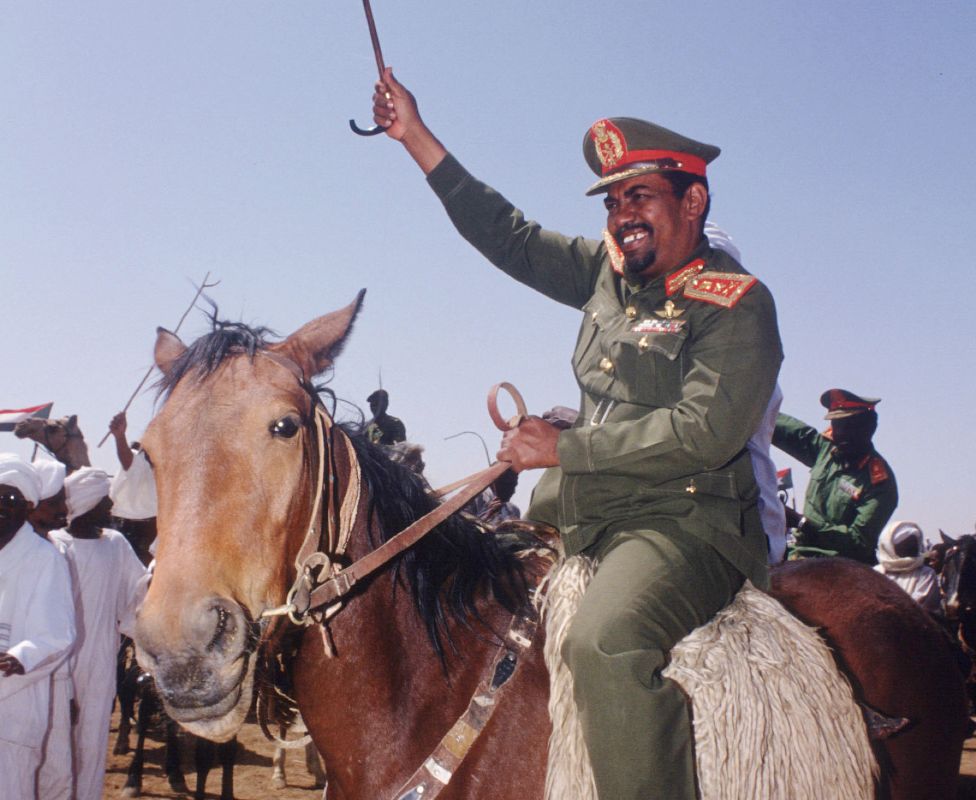
After seizing power in a military coup in 1989, President Bashir turned Khartoum into a global centre for militant jihadism" Getty
![]()
It is a complicated story which dates back 30 years to the early days of Sudan's Islamist government.
After seizing power in a military coup in 1989, President Bashir turned Khartoum into a global centre for militant jihadism.
Al-Qaeda and other extremist groups used Sudan as the base for carrying out terror attacks in the US, Saudi Arabia, Egypt, Ethiopia, Uganda, Kenya and elsewhere.
After the first terror attack on New York's World Trade Center in 1993, the US designated Sudan as a state sponsor of terrorism.
CIA co-operation
International financial sanctions and military pressure from neighbouring countries which supported Sudanese rebels pushed Sudan to expel Osama bin Laden and other jihadists three years later.
Shortly after the 11 September 2001 attacks, Sudan's security services became a valued partner with the US Central Intelligence Agency (CIA).
On that basis, Sudan should have been removed from the state sponsors of terror list.
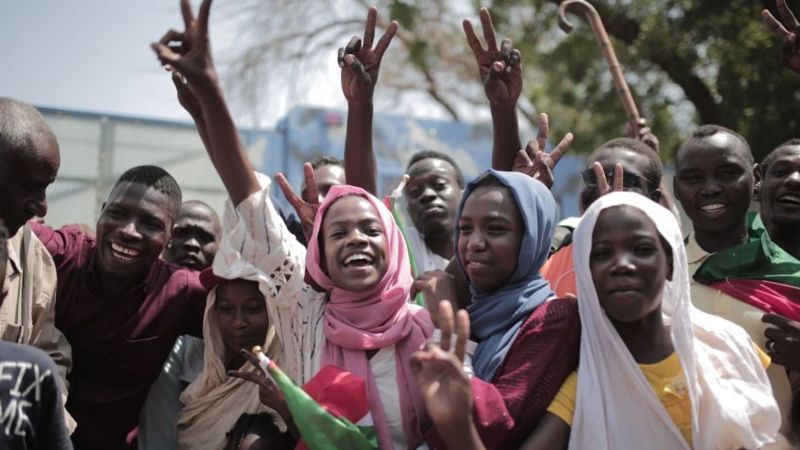
Despite the celebrations following Sudan's transition to democracy last year, US sanctions have not been lifted. AFP
But members of Congress were hostile to Khartoum for a host of other reasons, including the war in Darfur and human rights abuses, and the listing stayed in place.
And the Bashir government still operated in the shadows: it kept open its links to Iran and Hamas, and on at least two occasions Israeli fighter planes attacked convoys travelling up Sudan's Red Sea coast, allegedly taking arms to Hamas.
In 2016, under pressure from Saudi Arabia and the United Arab Emirates, the Bashir government cut its ties with Iran.
Yet after the democratic revolution last year, Washington DC was slow to shift.
US State Department officials wanted to keep the leverage of one of their most powerful tools. And they were worried that the new democratic regime might not last long.
Senators block terror list removal
The problem was that keeping sanctions on Sudan could easily become a self-fulfilling prophecy, condemning the country to state failure.
As long as Sudan stays blacklisted, crippling financial sanctions stay in place. Legitimate Sudanese businesses are handicapped, foreign direct investment is shackled and the International Monetary Fund and World Bank cannot adopt a package to relieve its massive debt - $72bn (£55.6bn) and counting.
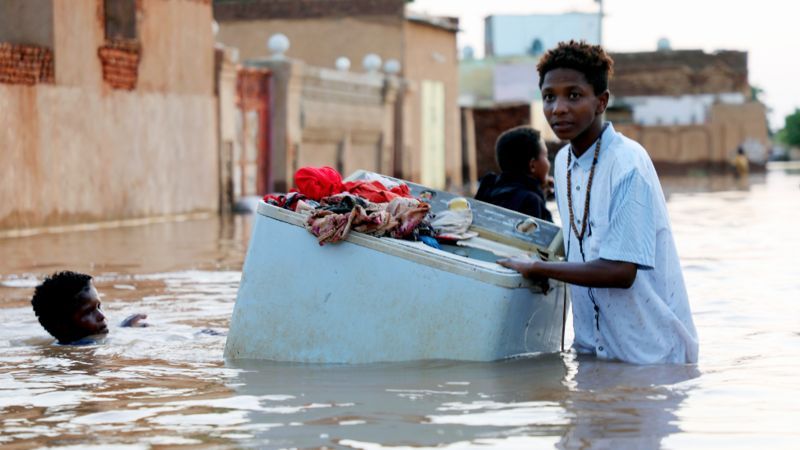
More than 860,000 people have been affected by unprecedented flooding in Sudan this year EPA
More than 860,000 people have been affected by unprecedented flooding in Sudan this year
The scale of hunger today is terrifying: the UN classes 9.6 million people as "severely food insecure".
This is made worse by the Covid-19 shutdown and floods. It is a crisis that cannot be overcome by food handouts - it needs a massive injection of economic assistance.
Over recent months, a deal to remove the terror listing was slowly making its way through Congress, held up by demands from the relatives of victims of al-Qaeda attacks in East Africa and Yemen that compensation be paid.
Sudan agreed to a package of $335m. But in September two Democratic senators - Chuck Schumer and Bob Menendez blocked the measure, partly because they wanted to keep open the prospects of the relatives of victims of 9/11 mounting a case.
The Trump administration is offering Sudan a way out.
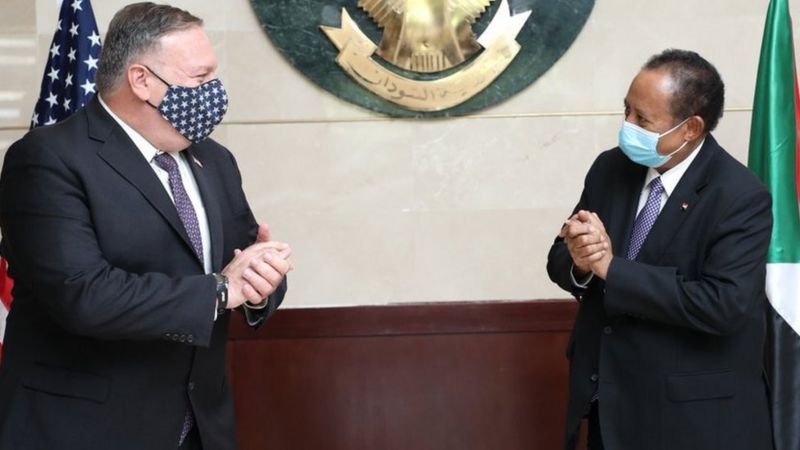
US Secretary of State Mike Pompeo went to Khartoum in August to offer Sudan's PM Hamdok a deal GETTY IMAGES
Visiting Khartoum at the end of August, Secretary of State Mike Pompeo proposed a deal to Sudan's civilian Prime Minister Abdalla Hamdok: if Sudan recognised Israel, President Trump would circumvent the Congressional blockage.
Following the UAE's decision last month, Sudan, a member of the Arab League, would be only the fifth Arab state to do so.
This would be a huge boost to the administration's campaign to normalise Arab relations with Israel in the weeks before the election.
Recognising Israel would be a momentous step for Sudan - that indeed is the whole point.
Good deal for the generals
The most vociferous opponents of the move are the Islamists, now out of power. But it is controversial across the political spectrum, and the civilian coalition includes many who insist on peace with the Palestinians first.
![]()
You may also be interested in:
- The country where black people are called slaves
- How Sudan's rebel deal offers lifeline for peace
- The warlord who may control Sudan’s future
- Flooding threatens Sudan's ancient pyramids
![]()
Mr Hamdok knows that his coalition of civilian supporters would likely fracture if he made the decision.
He told Mr Pompeo that a decision on the issue should await a democratically elected government, due in three years' time.
Although Mr Hamdok and his civilian cabinet are in office, it is Sudan's generals who wield real power.
Backed by the UAE, Saudi Arabia and Egypt, the chairman of the transitional council, Lt Gen Abdel Fattah al-Burhan and his deputy Lt Gen Mohamed Hamdan Dagolo, known as "Hemeti", command troops and money.
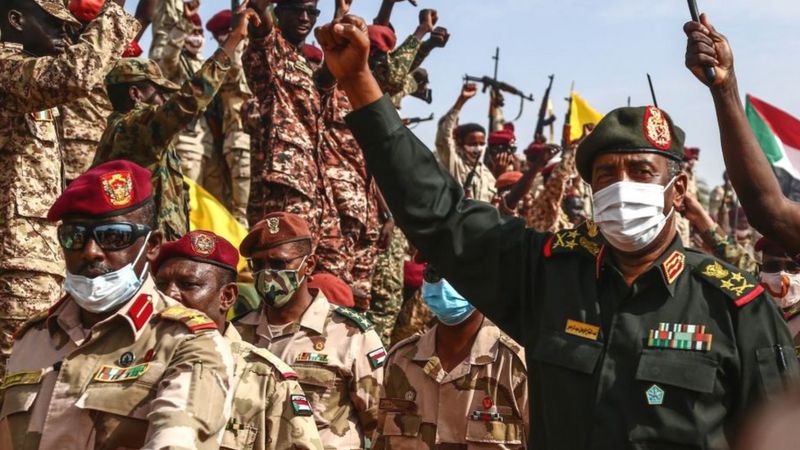
Sudan's Gen Burhan (R), who leads the transitional council, is among the officers who wield the real power in Sudan GETTY IMAGES
And it is these generals who are dealing with Israel. Gen Burhan met Israeli Prime Minister Benjamin Netanyahu in February - without informing Mr Hamdok - and the two are due to meet again soon.
For Gen Burhan and Gen Hemeti, the US-Israel deal promises them the international recognition they crave without the inconvenience of democracy.
That is why Sudanese democrats are demanding that it be scrutinised carefully.
When popular protests forced Bashir out in April last year, Gen Burhan and Gen Hemeti took over. Two months later their troops killed over 100 protesters.
This caused an outcry, after which, in a deal brokered by the US, UK, Saudi Arabia and the UAE, they agreed to share power with a civilian cabinet.
'Separate issues'
The bottom line is that the military tolerate the civilians only because they need international respectability. The Sudanese public has not forgiven the generals for their brutality and venality.
The older generation remembers Operation Moses, the secret 1984 deal between then-President Jaafar Nimeiri to allow Israel to airlift Ethiopian Jews from refugee camps in Sudan. Nimeiri was later accused of pocketing millions of dollars in bribes from Mossad, Israel's secret service.
A cabal of officer-businessmen controls vast shadowy commercial empires built up under Bashir, which are getting stronger by the day.
When the central bank runs out of money to pay salaries, it goes begging to these generals for the cash. If they are rewarded, Sudan will remain a kleptocracy.
For Israelis, recognition by another Arab country is certainly a prize.
But for the young Israelis and their US counterparts who protested against the mass atrocities in Darfur 15 years ago, legitimising the men who commanded the militias that perpetrated those massacres is a morally dubious step.
Mr Hamdok's position is the logical one: lifting the terror blacklisting and recognising Israel are separate issues.
He argues that Sudan should be removed from the terror list at once, because it has removed terrorists from its soil and because its democracy is worth saving.
And if Israel is recognised by a truly democratic Arab nation - that would be a prize worth winning.
Alex de Waal is the executive director of the World Peace Foundation at the Fletcher School of Law and Diplomacy at Tufts University in the US.
